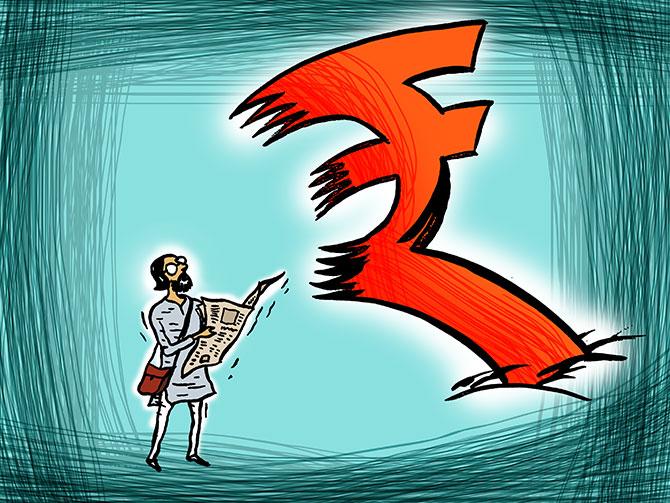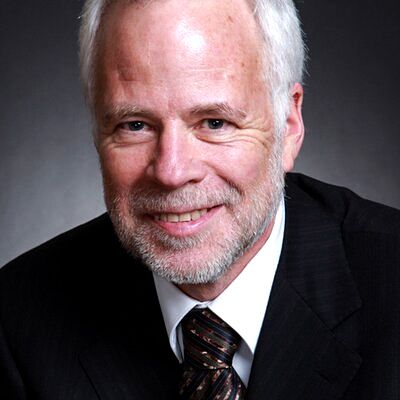Barry Eichengreen, professor of economics and political science, University of California, Berkeley, analyses the transparency of the Reserve Bank of India, the growth rate of the Indian economy and why he feels globalisation can never be rolled back.
Illustration: Dominic Xavier/Rediff.com.

Barry Eichengreen, professor of economics and political science at the University of California, Berkeley, says the rupee could become one of the top five global currencies in the world in 20 to 30 years.
The professor, whose study in 2009 had termed the Reserve Bank of India one of the least transparent central banks in the world, was in India to deliver the Exim Bank’s commemorative lecture.
In an interview with Anup Roy, Eichengreen said the RBI had improved its transparency significantly:
The Dincer-Eichengreen study in 2009 had found the RBI to be one of the least transparent central banks in the world. How is the situation now?
There would be an update of that in a few weeks.
I think the bank (RBI) has moved a good deal in the direction of transparency -- in terms of analysing votes (of the monetary policy committee), and publishing an inflation report, describing what its mandate is, and publishing an inflation forecast. For me, that’s really the essence of the central bank transparency.
With US President Donald Trump are we moving back to the pre-globalisation era?
I think there is a risk of turning the clock back.
My view has been that in the age of hyper-globalisation, where international trade and finance are growing faster than the world economy, globalisation is a fact of 21st century economic life, and that it can’t be rolled back.
Global supply chains and international economic relations have become so deeply embedded in the world economy that they could not be torn apart because the cost of putting in trade restrictions would be very high.
There are debates whether Trump is really going to follow through the restrictive trade policies he promised in the campaign. It would be crazy to label China a currency manipulator because the renminbi is no longer undervalued. Similarly, the idea of imposing 35 per cent tariffs on all imports, I think, would be regarded as extremely disruptive.

Are we heading towards a currency war?
I don’t think we are in a currency warfare situation unless Mr Trump starts one, which he could.
So the problem we could see coming is that the President and the Trump administration would like a weaker dollar and much of what it hopes to do would make the dollar stronger. So if he engages in some kind of fiscal expansion, a tighter monetary policy and loose fiscal policy, or a border adjustment tax, and if he takes a big infrastructure spending initiative, those things are going to cause the dollar to strengthen, which will frustrate his efforts to make manufacturing more competitive and bring manufacturing jobs back to the US.
So, the president will look for the villain who is responsible for this undesirable strength of the dollar. And it could be a trade and currency conflict as a result of what the US does.
Do you think this will give rise to other currencies as de facto global?
I think we are beginning to see glimmers of the move to a multi-polar international monetary and financial system where there will be three big global currencies -- the dollar, euro and the renminbi. I think in 20 years it may happen.
Or we could have five currencies — the euro, dollar, renminbi, rupee and the Brazilian real. India is going to be one of the largest economies in the world and economic size is one of the preconditions for international currency status.
You have to have well-developed financial markets, people have to be confident in the stability of your policies and then you have to have a big economy that engages in a lot of cross-border transactions.
I think India would satisfy those conditions.
Former RBI Governor Raghuram Rajan has time and again warned about the expansionary monetary policy followed by global central banks. But you seem to have a different opinion.
Raghuram Rajan is a friend of mine and co-author. But I disagreed with his view about what the US Fed should be doing when it engaged in quantitative easing.
He was right in pointing to the fact that when the Fed, the ECB (European Central Bank), and the BoJ (Bank of Japan) took interest rates down to zero and engaged in quantitative easing, that had some side-effects.
But it’s like administering chemotherapy to a cancer patient. You need to kill the cancer. We needed to kill the global financial crisis.
Do you think the demonetisation exercise was a good idea?
It was probably a worthwhile thing for India to do in November.
It caused a brief, small slowdown in the economy and now the prospect of growth is at 7 to 7.5 per cent, demonetisation or not.
Unfortunately, the process hit a lot of poor people who were especially reliant on the cash economy and it would be nice if the government developed other programmes to help the poor people whose lives were disrupted.
Do you think the RBI should cut rates more?
The inflation rate is above the middle of the band (4 per cent plus/minus 2 per cent the consumer price index target), plus the economy is growing at an appropriate rate. I would say it is a success and I don’t see a compelling reason to mess with a success.











